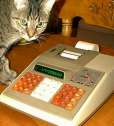ISBN 0-9510733-3-8
I spent a good part of my evening reading a book that just arrived in the mail: RCL 20: People, Dreams & HP Calculators by W. A. C. Mier-Jedrzejowicz Ph. D. & Frank Wales.
Wlodek Mier-Jedrzejowicz's name, hard as it may be to spell or pronounce, is nevertheless well known in the community of calculator enthusiasts. He is a founding member of the HPCC, the Handheld and Portable Computer Club, formerly known as the UK chapter of the PPC, an acronym that stood for Personal Programmable Calculators.
I was trying to decide how best to sum up my impressions about this book, but then I realized that it's already been done. All I have to do is quote the authors themselves. Here's what they wrote in the book's Introduction:
Today, the term 'calculator' either conjures up the idea of 'adding machine', or those brightly-coloured devices sold in bubble-packs and intended for school and university mathematics work. But the kinds of calculators that were the focus of our club's attention were the only truly programmable and portable computers available to ordinary people. The programmability was key--it made them little software engines that could be applied to any task, not just mathematics. That they were still called 'calculators' belied their real capabilities--these machines were true portable computers[.]
My sentiments exactly. The same words in fact could serve as an introduction to RSKEY.ORG.
Like my Web site, the book borrows its title from a well-known calculator key: RCL 20 is HP calculator language for recall 20. In this case of course, what is being recalled is not a floating point value from register 20, but the events and happenings of the last 20 years.
Yet it is not just another overly sentimental collection of articles reminiscing about a bygone past. True, there are recollections here: Dean Lampman, for instance, recalls how it felt to be the recipient of an HP-65 prototype with a grand total of 5 still imperfect magnetic cards. (They made some more, and almost got sued for it.) But there is also a look forward, toward an uncertain, but not necessarily gloomy future. Indeed, the very first chapter of the book is a short science-fiction story by Gordon Dickson ("Thank You, Beep...!"), originally published in the PPC Journal in 1982. The story, set in the year 2025, describes a minor misadventure of a business executive and his trusty HP-XX2050 digital assistant. Digital assistants have since become everyday accessories, but will they still carry the HP logo in 2025? Wlodek Mier-Jedrzejowicz expresses his hope that it will be so, in the next to last article, Half a Beep.
Technical people are often not very good storytellers. The chapters of RCL 20 are a pleasant exception. You don't have to be a "calculator nut" to enjoy them, to feel a sense of shared adventure, to understand the incredible excitement that these machines brought to their owners over the years. In an ever more fearful world that is turning increasingly inward, the thoughts of people who continue to look forward with optimism to a future made better by technology are always worth reading.
RCL 20 can be purchased directly from the authors: see http://www.hpcc.org/conferences/rcl20/index.html for details.


